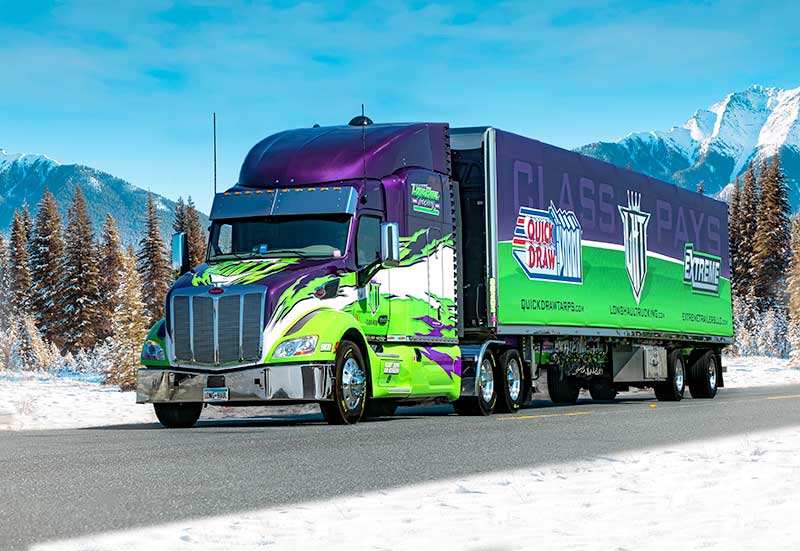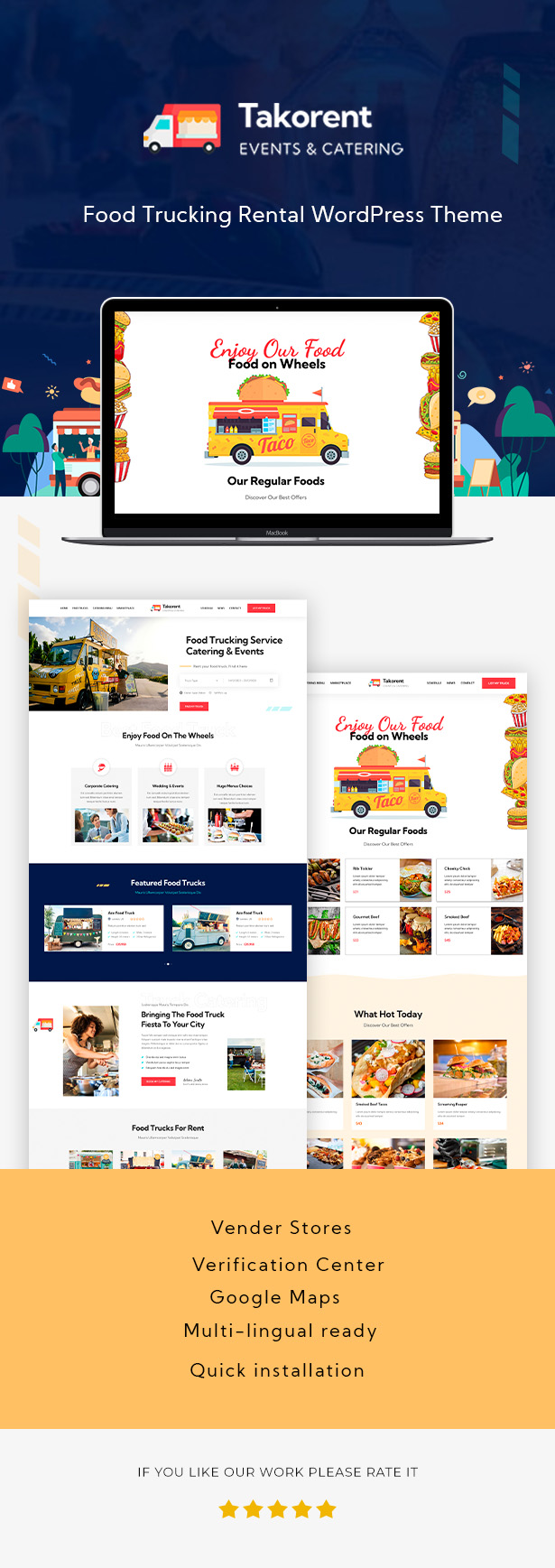Food Trucking Companies: Navigating the Mobile Culinary Landscape pickup.truckstrend.com
In an era defined by innovation, flexibility, and a craving for unique culinary experiences, food trucking companies have emerged as a vibrant and indispensable force in the gastronomic world. Far from being merely a trend, these mobile kitchens represent a dynamic sector of the food industry, offering entrepreneurs a more accessible entry point into the culinary business and providing consumers with an exciting array of diverse, high-quality, and often affordable meal options. Food trucking companies are essentially businesses that operate a kitchen on wheels, serving food directly to customers from a specially equipped vehicle. Their importance stems from their ability to bring gourmet, ethnic, or specialty foods directly to the streets, festivals, corporate campuses, and private events, bypassing the significant overhead and rigid structure of traditional brick-and-mortar restaurants. They foster culinary creativity, stimulate local economies, and have reshaped how we think about dining out, making sophisticated cuisine both portable and pervasive.
The Rise of Mobile Gastronomy: Why Food Trucks?
Food Trucking Companies: Navigating the Mobile Culinary Landscape
The proliferation of food trucking companies is not accidental; it’s a response to evolving consumer preferences and a strategic advantage for aspiring restaurateurs. The inherent benefits of this business model make it incredibly appealing:
- Lower Startup Costs: Compared to opening a traditional restaurant, which can easily cost hundreds of thousands to millions of dollars, a food truck requires a significantly smaller initial investment. This reduces financial barriers for culinary entrepreneurs.
- Flexibility and Mobility: A food truck can go where the customers are, adapting to events, weather, or shifting demographics. This agility allows companies to maximize sales opportunities and test different markets without committing to a fixed location.
- Direct Customer Interaction: The intimate setting of a food truck often fosters direct engagement between chefs/owners and customers, building strong relationships and brand loyalty. This personal touch is a powerful marketing tool.
- Marketing on Wheels: A custom-wrapped food truck is a moving billboard, generating brand awareness and curiosity wherever it goes. Its unique appearance often becomes a talking point, drawing new customers.
- Menu Agility and Concept Testing: Food trucks allow for rapid menu adjustments based on feedback, ingredient availability, or culinary trends. Entrepreneurs can test new concepts or niche cuisines with lower risk before scaling up.
- Catering and Private Events: Beyond street sales, food trucks are highly sought after for private parties, corporate events, weddings, and festivals, providing a lucrative additional revenue stream.

For customers, the appeal lies in convenience, novelty, and the quality-to-price ratio. Food trucks often offer innovative dishes not found elsewhere, at prices that are typically more accessible than full-service restaurants, making them a win-win for both providers and patrons.
Types of Food Trucking Companies
The diversity within the food truck industry is immense, reflecting a wide range of business models and culinary specializations:
- Cuisine-Specific Trucks: These are the most common, focusing on a particular type of food, such as gourmet tacos, artisanal pizzas, Korean BBQ, vegan delights, specialized desserts, or classic American comfort food. Their success hinges on perfecting their niche.
- Event-Focused Trucks: Many food trucks primarily operate at large-scale events like music festivals, sporting events, fairs, and community gatherings. They thrive on high-volume sales over short periods and often travel extensively.
- Daily Route/Location-Based Trucks: These trucks establish regular schedules and specific locations, often frequenting office parks during lunch, residential neighborhoods in the evenings, or popular downtown spots. They build a loyal local following.
- Catering-Centric Trucks: While all food trucks can cater, some companies are built primarily around private event bookings. Their truck serves as a mobile kitchen for pre-booked gigs, rather than relying on walk-up street sales.
- Specialty Beverage/Dessert Trucks: This category includes coffee trucks, juice bars, ice cream trucks, or even mobile cocktail bars. They often complement food trucks at events or operate independently in specific niches.


Starting Your Own Food Trucking Company: A Step-by-Step Guide
Launching a food trucking company requires careful planning and execution. It’s more than just cooking on wheels; it’s building a sustainable business.
1. Develop a Robust Business Plan
This is your blueprint. Define your concept (menu, theme, target audience), conduct thorough market research (competition, demand, ideal locations), create detailed financial projections (startup costs, operating expenses, revenue forecasts), and outline your operational strategy (sourcing, staffing, marketing).
2. Navigate Legal and Regulatory Hurdles
This is perhaps the most critical and complex step.
- Business Registration: Choose a legal structure (LLC, sole proprietorship, corporation) and register your business with the state.
- Health Permits: Obtain necessary permits from local and state health departments. This often involves detailed inspections of your truck’s kitchen setup, water systems, waste disposal, and food handling practices. Requirements vary significantly by jurisdiction.
- Food Safety Certifications: Ensure you and your staff have relevant food safety certifications (e.g., ServSafe).
- Vehicle Permits & Licenses: Secure Department of Transportation (DOT) compliance, vehicle registration, and any specific permits required for operating a commercial vehicle.
- Business Licenses & Sales Tax: Obtain general business licenses and register for sales tax collection with your state.
- Insurance: Crucial for protecting your assets. You’ll need general liability, commercial auto insurance, and potentially workers’ compensation if you have employees.
3. Acquire and Equip Your Truck
This is the heart of your operation.
- New vs. Used: New custom-built trucks offer reliability and customization but come at a high cost. Used trucks are more affordable but may require significant renovations and maintenance.
- Leasing vs. Buying: Leasing can reduce upfront capital but means no ownership. Buying outright offers equity but demands more initial cash.
- Essential Equipment: Outfit your truck with commercial-grade cooking equipment (grills, fryers, ovens), refrigeration units, a robust generator, a three-compartment sink, handwashing station, fire suppression system, and a point-of-sale (POS) system.
4. Craft Your Menu and Sourcing Strategy
Your menu should be efficient to prepare in a compact space, offer high-quality ingredients, and stand out. Focus on items that travel well and can be served quickly. Establish reliable relationships with food suppliers to ensure consistent quality and pricing.
5. Secure Funding
Options include self-funding, small business loans (SBA loans), lines of credit, crowdfunding, or seeking investors. A solid business plan is essential for any funding application.
Operational Excellence: Running a Successful Food Truck
Once launched, success hinges on efficient operations and strategic management.
- Marketing and Branding: Develop a strong brand identity, including a memorable logo and truck wrap. Leverage social media platforms (Instagram, Facebook, TikTok) to announce locations, post mouth-watering photos, and engage with customers. Utilize food truck finder apps and local event calendars.
- Staffing: Hire reliable, customer-focused individuals who understand food safety and can work efficiently in a small space. Provide thorough training.
- Inventory Management: Implement a system to track inventory, minimize waste, and ensure you always have fresh ingredients. Build strong relationships with suppliers.
- Customer Service: Speed, accuracy, and friendly service are paramount. A positive customer experience encourages repeat business and word-of-mouth referrals.
- Route Planning and Location Strategy: Research high-traffic areas, secure permits for specific spots, and actively seek out festivals, markets, and private catering opportunities. Data on past sales and foot traffic can inform future decisions.
- POS Systems: Invest in a reliable POS system that can handle quick transactions, track sales, manage inventory, and accept various payment methods.
Navigating Challenges and Finding Solutions
The food truck industry, while rewarding, presents its own set of unique challenges.
- Competition: As the industry grows, so does competition. Solution: Differentiate your brand through unique cuisine, exceptional service, strong branding, and a memorable customer experience.
- Regulations and Permits: Local regulations can be a maze, changing frequently. Solution: Stay informed about all local, county, and state requirements. Build relationships with health inspectors and city officials. Consider joining a local food truck association for shared knowledge.
- Maintenance and Breakdowns: Mechanical issues can halt operations and be costly. Solution: Conduct regular preventative maintenance checks on your truck and equipment. Set aside an emergency fund for unexpected repairs and have a reliable mechanic on call.
- Weather Dependency: Rain, extreme heat, or cold can significantly impact sales. Solution: Diversify your income through catering gigs, seek out indoor events, or consider semi-permanent locations with shelter. Offer menu items suitable for different weather conditions.
- Long Hours and Physical Demands: Operating a food truck is physically demanding and involves long hours, especially during peak seasons. Solution: Efficient workflow planning, delegating tasks, hiring adequate staff, and prioritizing self-care are crucial for sustainability.
- Scaling and Growth: Expanding beyond a single truck can be challenging. Solution: Consider acquiring additional trucks, establishing a central commissary kitchen, or even exploring a brick-and-mortar spin-off if demand is consistently high.
Key Considerations for Longevity and Growth
For food trucking companies aiming for long-term success, several strategic elements are vital:
- Branding and Storytelling: Beyond the food, what’s your company’s story? A compelling narrative can connect with customers on a deeper level and foster loyalty.
- Technology Integration: Embrace online ordering, loyalty programs, and data analytics to understand customer behavior and optimize operations.
- Community Engagement: Participate in local events, collaborate with other small businesses, and contribute to community initiatives. Being a good neighbor can build goodwill and a strong customer base.
- Adaptability: The food industry is constantly evolving. Be prepared to adjust your menu, locations, and marketing strategies in response to trends, feedback, and market shifts.
- Financial Management: Meticulously track your finances, understand your profit margins, manage cash flow effectively, and plan for reinvestment to ensure sustainable growth.
Estimated Costs and Revenue Potential for a Food Trucking Company
The financial outlay and potential returns for a food truck business can vary widely based on location, concept, and scale. The table below provides broad estimates.
| Category | Item | Estimated Cost/Range (USD) | Notes |
|---|---|---|---|
| Startup Costs | |||
| Truck Acquisition | Used Truck (basic) | $30,000 – $70,000 | Often requires upgrades |
| Used Truck (equipped) | $70,000 – $120,000 | Ready to operate, varying condition | |
| New Custom-Built Truck | $120,000 – $250,000+ | Highly customizable, includes new equipment | |
| Permits & Licenses | Initial (Health, Business, Vehicle) | $500 – $5,000 | Varies significantly by state/county |
| Initial Equipment | Beyond truck’s included | $5,000 – $20,000 | POS system, smallwares, extra appliances, catering gear |
| Initial Inventory | Food, beverages, supplies | $1,000 – $3,000 | First stock of ingredients and consumables |
| Insurance | Annual Commercial (initial) | $2,000 – $5,000 | General liability, commercial auto, workers’ comp |
| Branding & Marketing | Wrap, logo, initial promotions | $3,000 – $15,000 | Truck wrap is a major visual investment |
| Contingency Fund | Unexpected costs | $5,000 – $10,000 | For repairs, emergencies, unforeseen expenses |
| Total Estimated Startup | $46,500 – $328,000+ | Highly dependent on truck choice and location | |
| Operating Costs (Monthly) | |||
| Food & Ingredients | Based on sales volume | $2,000 – $8,000+ | Largest variable cost |
| Fuel | Truck, generator | $300 – $1,000 | Varies by routes, hours of operation |
| Labor | Wages, payroll taxes | $2,000 – $6,000+ | If employing staff |
| Commissary Kitchen Fees | Rent for prep/storage space | $300 – $1,000 | Often required by health departments |
| Maintenance & Repairs | Ongoing vehicle/equipment upkeep | $200 – $1,000 | Can be higher for older trucks |
| Utilities | Propane, electricity (if not generator) | $200 – $500 | Cooking fuel, minimal electrical hookups |
| Permit Renewals/Fees | Ongoing regulatory costs | $50 – $200 | Monthly average of annual/bi-annual renewals |
| Marketing & Advertising | Social media ads, event fees | $100 – $500 | Ongoing promotional efforts |
| POS & Software Fees | Payment processing, subscription | $50 – $200 | For efficient transactions |
| Total Estimated Monthly OpEx | $5,200 – $19,400+ | Can fluctuate based on sales volume and staffing | |
| Revenue Potential | |||
| Daily Sales | Average per operational day | $500 – $2,000+ | Highly dependent on location, event, and customer traffic |
| Monthly Sales | (Daily Sales x Operating Days) | $10,000 – $40,000+ | Assuming 20 operating days/month |
| Annual Gross Revenue | $120,000 – $480,000+ | Before subtracting all expenses | |
| Profit Margins | Net profit after all expenses | 10% – 20% | Can vary significantly based on cost control and pricing strategy |
Disclaimer: These figures are general estimates. Actual costs and revenues can vary dramatically based on location, concept, business model, efficiency, and market conditions.
Frequently Asked Questions (FAQ)
Q1: How much does it cost to start a food truck?
A1: The initial investment can range from roughly $46,500 for a basic used truck setup to over $300,000 for a new, custom-built, fully equipped truck. This includes the truck itself, permits, initial inventory, and branding.
Q2: What permits and licenses do I need for a food truck?
A2: Requirements vary by jurisdiction, but generally include a business license, health permits (local and state), vehicle registration and commercial driver’s license (if applicable), food safety certifications (e.g., ServSafe), and specific permits for operating in different locations or at events. A commissary kitchen agreement is often required.
Q3: Is a food truck business profitable?
A3: Yes, a food truck business can be very profitable. Successful food trucks can generate annual revenues well over $100,000, with some hitting $400,000 or more. Profit margins typically range from 10% to 20%, depending on cost control, menu pricing, and operational efficiency.
Q4: How do food trucks find locations to operate?
A4: Food trucks find locations through a variety of methods: researching high-traffic areas (office parks, downtowns), obtaining permits for specific public spaces, participating in organized food truck rallies, booking private events (catering), and securing spots at festivals, markets, and concerts. Networking with event organizers and other businesses is key.
Q5: What are the biggest challenges for food truck owners?
A5: Key challenges include navigating complex and ever-changing regulations, intense competition, managing unpredictable weather impacts, dealing with truck maintenance and breakdowns, and the demanding physical nature of the work. Adapting to these challenges through meticulous planning and a proactive approach is crucial.
Q6: Do I need a commercial kitchen (commissary)?
A6: In most jurisdictions, yes. Health departments often require food trucks to operate out of a licensed commercial kitchen (commissary) for food preparation, storage, water disposal, and cleaning. This ensures adherence to strict health and safety standards beyond what’s possible on the truck itself.
Conclusion
Food trucking companies represent a dynamic and exciting frontier in the culinary world, blending entrepreneurial spirit with a passion for food. They offer a unique blend of flexibility, direct customer engagement, and a lower barrier to entry compared to traditional restaurants, making them an attractive venture for aspiring chefs and business owners. While the path to success is paved with challenges, including complex regulations, fierce competition, and the inherent demands of mobile operations, the rewards of building a beloved brand and serving delicious food on the go are immense. Ultimately, success in food trucking hinges on a blend of culinary excellence, astute business management, unwavering perseverance, and a deep understanding of the mobile market. As urban landscapes continue to evolve and consumer tastes diversify, food trucking companies will undoubtedly remain a vibrant and integral part of the global gastronomic tapestry, driving innovation one delicious meal at a time.



